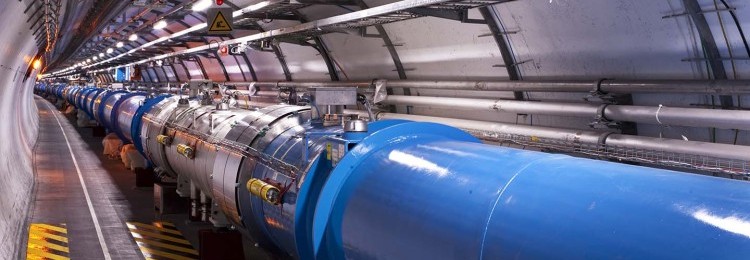At CERN, the European Organization for Nuclear Research, physicists and engineers are probing the fundamental structure of the universe. They use the world's largest and most complex scientific instruments to study the basic constituents of matter, the fundamental particles. The particles are made to collide together at close to the speed of light. The process gives the physicists clues about how the particles interact, and provides insights into the fundamental laws of nature.
Accelerator Physicist (Collective Effects) Job Description
Accelerator Physicist (Collective Effects)
Introduction
Are you an Accelerator Physicist (Collective Effects) experienced in collective effects and interested in working in an exciting international environment at the forefront of modern science? Take part and join one of the teams that help to deliver unique high-energy particle beams used by physicists from all over the world to answer questions at the heart of particle physics! CERN, take part!
As an Accelerator Physicist (Collective Effects) you will join:
- The Beams (BE) Department which is at the heart of the CERN accelerator complex and hosts the groups responsible for the beam generation, acceleration, diagnostics, controls and performance optimization.
- The Accelerators and Beam Physics (ABP) Group, responsible for beam performance from the source to the Large Hadron Collider (LHC) and carries out Research & Development (R&D) activities on the upgrade of the LHC, its injectors, and future colliders (CLIC and FCC).
- The Hadron Synchrotron Coherent effects (HSC) Section which is responsible for studying coherent effects and their mitigation by developing theoretical models, simulation codes and by conducting experimental research. Coherent transverse instabilities induced by beam coupling impedance and space charge, beam-beam, electron cloud effects and their interplay can limit the beam intensity and brightness and therefore the performance of the present and future CERN accelerators. An accurate theoretical description, precise models, realistic simulations and thorough benchmarking with dedicated experiments are required in order to assess the present and future performance limitations and devise cures, mitigation measures and the corresponding operational scenarios. (https://be-dep-abp.web.cern.ch/content/hsc-hadron-synchrotrons-coherent-effects).
FunctionsAs an Accelerator Physicist (Collective Effects), you will contribute to the study of the collective effects in particle accelerators, in particular the mechanisms responsible for transverse coherent beam instabilities. You will also devise mitigation techniques to push further the performance of the existing and future CERN accelerators.
Specific tasks will include:
- Development and maintenance of simulation codes to study single-bunch and coupled-bunch coherent beam instabilities in the CERN accelerators by including the combined effects of: beam coupling impedance; space charge; electron cloud (without or with another ion beam); beam-beam; lattice optical properties (tune, coupling, chromaticity and other nonlinear properties); longitudinal motion; transverse feedbacks, etc.
- Validation of the simulations in the different CERN accelerators by conceiving and conducting machine experiments and analysing the corresponding beam data.
- Conception of cures and/or mitigation techniques.
Accelerator Physicist (Collective Effects) Job Requirements
Qualifications
Master's degree or PhD or equivalent relevant experience in the field of physics or engineering or a related field.
Experience:
- Demonstrated experience in a scientific environment preferably in beam dynamics and/or operation of particle accelerators.
- Demonstrated experience to perform and optimize multi-particle simulations.
- Experience with experimental techniques and analysis of data from beam measurements.
Technical competencies:- Knowledge and application of computational and mathematical physics: knowledge of multi-particle simulation codes such as (py)HEADTAIL would be an asset.
- Knowledge and application of accelerator physics theory.
- Knowledge and application of collective effects (impedance, beam-beam, space charge, electron cloud, intra beam scattering).
- Analysis and optimization of accelerator performance.
Language skills:- Spoken and written English: ability to draw-up technical specifications and/or scientific reports and to make oral presentations.
- Knowledge of the French language or the willingness to acquire this rapidly would be an advantage.
Eligibility and closing datesDiversity has been an integral part of CERN's mission since its foundation and is an established value of the Organization. Employing a diverse workforce is central to our success. We welcome applications from all Member States and Associate Member States (http://cern.ch/jobs/content/member-states).
This vacancy will be filled as soon as possible, and applications should normally reach us no later than 24.06.2018.
Employment ConditionsContract type: Limited duration contract (5 years). Subject to certain conditions, holders of limited-duration contracts may apply for an indefinite position.
These functions require:
- Work in radiation areas.
- Interventions in underground installations.
- Work during nights, Sundays and official holidays, when required by the needs of the Organization.
Accelerator Physicist (Collective Effects) Application Information
Please apply with your CV and cover letter by the 'apply' button below
Remember - you found this opportunity on Qreer.com
Accelerator Physicist (Collective Effects) Summary
| Education Backgrounds: |
Micro / Nano Technology
Physics
|
| Specialties: |
Experimental Physics
Research (R&D)
Semiconductor Physics
Thermodynamics
Vacuum technology
|
| Education Level: |
Postgraduate (Masters)
Doctorate (PH.D)
|
| Experience: |
0 - 2 years
2 - 5 years
5 - 10 Years
|
| Languages spoken: |
English
|
| Job Location: |
, , Switzerland |
Apply

